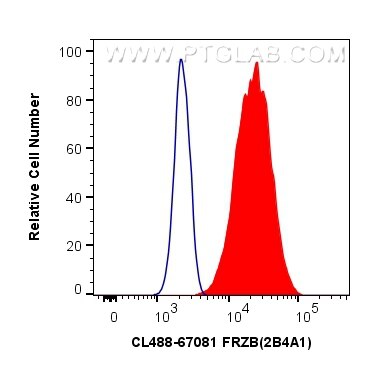Tested Applications
| Positive FC (Intra) detected in | Neuro-2a cells |
Recommended dilution
| Application | Dilution |
|---|---|
| Flow Cytometry (FC) (INTRA) | FC (INTRA) : 0.40 ug per 10^6 cells in a 100 µl suspension |
| It is recommended that this reagent should be titrated in each testing system to obtain optimal results. | |
| Sample-dependent, Check data in validation data gallery. | |
Product Information
CL488-67081 targets FRZB in FC (Intra) applications and shows reactivity with human, mouse samples.
| Tested Reactivity | human, mouse |
| Host / Isotype | Mouse / IgG1 |
| Class | Monoclonal |
| Type | Antibody |
| Immunogen |
CatNo: Ag28147 Product name: Recombinant human FRZB protein Source: e coli.-derived, PET28a Tag: 6*His Domain: 153-325 aa of BC027855 Sequence: IVTADGADFPMDSSNGNCRGASSERCKCKPIRATQKTYFRNNYNYVIRAKVKEIKTKCHDVTAVVEVKEILKSSLVNIPRDTVNLYTSSGCLCPPLNVNEEYIIMGYEDEERSRLLLVEGSIAEKWKDRLGKKVKRWDMKLRHLGLSKSDSSNSDSTQSQKSGRNSNPRQARN Predict reactive species |
| Full Name | frizzled-related protein |
| Calculated Molecular Weight | 325 aa, 36 kDa |
| Observed Molecular Weight | 36 kDa |
| GenBank Accession Number | BC027855 |
| Gene Symbol | FRZB |
| Gene ID (NCBI) | 2487 |
| RRID | AB_3084306 |
| Conjugate | CoraLite® Plus 488 Fluorescent Dye |
| Excitation/Emission Maxima Wavelengths | 493 nm / 522 nm |
| Form | Liquid |
| Purification Method | Protein G purification |
| UNIPROT ID | Q92765 |
| Storage Buffer | PBS with 50% glycerol, 0.05% Proclin300, 0.5% BSA, pH 7.3. |
| Storage Conditions | Store at -20°C. Avoid exposure to light. Stable for one year after shipment. Aliquoting is unnecessary for -20oC storage. |
Background Information
Frzb (also known as sFRP3) is a member of the secreted frizzled related protein (SFRP) family, originally identified as a chondrogenic factor during bone morphogenesis (PMID: 29209231). It was subsequently shown to be a regulator in Wnt signaling, and also have a role in regulating cell growth and differentiation in specific cell types. FRZB was seen to be acting as an oncogene in some cancer, such as metastatic renal cancer.
Protocols
| Product Specific Protocols | |
|---|---|
| FC protocol for CL Plus 488 FRZB antibody CL488-67081 | Download protocol |
| Standard Protocols | |
|---|---|
| Click here to view our Standard Protocols |




